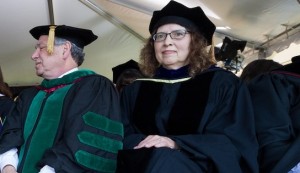“Everyone, please grab a chair. Let’s move them into a circle.”
Those are the first words I recall Mary DeShazer saying to us on the first day of her Women and Literature class when we faced desks arranged in orderly rows. We promptly shifted the desks, and we did the same for every class session that followed. Initially I thought this weekly ritual was about furniture placement. Now, I think that Dr. DeShazer had us form a circle to eliminate corners — corners in which we might have tried to hide.
I do not mean to imply something sinister about Dr. DeShazer, who retired this week after more than three decades as an English professor and professor of Women’s, Gender and Sexuality Studies. She cared too much about her students to allow any of us to slip silently and unnoticed into the dark recesses of the room. She expected a lot from each one of us, and, in turn, we expected a lot from each other and ourselves. Dr. DeShazer nurtured a spirit of trust and respect in that classroom. Her passion for the readings and authors excited us, but she was as interested in listening to us and learning alongside us as she was in speaking to us. And so, for me that circle we formed every Wednesday afternoon from 4 p.m. to 6:30 p.m. became a sacred space from which a whole new world emerged.
Over the course of the semester, I would drop by her office many times, seeking help to tease out the latest idea bouncing around inside my head. She always had time for me, suggesting authors to check out, lending me books and raising questions to push me further in my thinking. She often returned my papers marked with nearly as many questions as comments. With Dr. DeShazer there was always a back-and-forth exchange of ideas.
Through those conversations, my own interests developed, and Dr. DeShazer helped me to chart a course to explore them. (In fact, those interests persisted long after I’d moved beyond the Wake Forest gates and became the focus of my graduate work at Georgetown University.) That extraordinary time spent sitting in her classroom still informs the way I view and make sense of the world. When I read about the first generation of South Africans born after Apartheid going to the polls, or the shooting of Pakistani activist Malala Yousafzai by a Taliban gunman or the shifting landscape of civil rights for LGBT Americans, my mind immediately returns to what we read and what we learned and what we said in Dr. DeShazer’s class. Yes, we learned to use gender as one lens of analysis, but our work was never only about gender.
I remember early in the semester my roommate asking me what we talked about in class. “Everything,” I replied.
And now, 15 years later, I still feel so grateful for this experience. The kind of mentoring relationship I had with Dr. DeShazer at Wake Forest is the kind of relationship that you hope you’ll have with a professor when you’re leafing through glossy college brochures in high school. What more could I have wanted in a university than to have the chance to discover where my academic interests lay, explore them to the fullest of my ability and learn to express them in my speech and writing with skill and confidence? What more could I have wanted in a professor than one who would provide support and guidance along the way?
A couple of months before I graduated, Dr. DeShazer inscribed my copy of the anthology of women’s literature that she had edited. Her inscription talks about the experience of not just teaching me but learning from me. From me! Her words remind me that the ideas that bounce around inside my head are indeed worth exploring and sharing. This is still a powerful message for me today, just as it was when I was a young undergraduate, sitting in that circle, a sacred space with no corners, and nowhere to hide. And thank goodness for that.
After graduating in 2001, Karen Roberts Nabavi completed her master’s degree in Communication, Culture and Technology at Georgetown University. She spent several years as an IT project manager and now works as an IT consultant. She lives with her husband, Ali Nabavi, and two sons, Elliott, 2, and Wesley, 7 months, in Washington, D.C.



